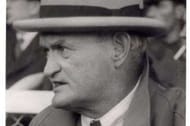In sports, there are always saviours. Always have been, always will. On March 8th, Sergi Roberto came cold off the bench and secured the most improbable of Champions League comebacks against Paris Saint-Germain. But even in the pantheon of heroes at the Camp Nou; he falls into line behind one man. Irishman Patrick O’Connell.
Belfast Celtic, a now defunct club based in Northern Ireland, was the first footballing home of the man who would the go on to captain Ireland, who would also line out for Manchester United, Sheffield Wednesday and Hull City. A centre-back who grew up in the shadows of Ireland’s most historic sporting venue – Croke Park – he would captain his country to their first win in the Home Championships in 1941.
Playing with a broken arm in a victory over Scotland adds to the legendary status. But controversy played as much a part in this dramatic narrative as valour. Before World War I was to cause suspension of the English league, O’Connell’s United team and Liverpool were caught up in a match-fixing scandal that saw seven players banned for life.
O’Connell was not one of the seven but a bizarre penalty incident didn’t shroud his image well. World War I came and after a sojourn working in a factory specialising in military weapons, he played post-war in Scotland with Dumbarton before his final days as a player ended humbly, with Ashington, with whom he was a player-manager.
Spain and a new adventure
A new life in Spain beckoned. Not that his wife and four children were informed. He left them to fend for themselves, ultimately marrying again in his new homeland. The term re-married, however, couldn’t be applied as he never divorced his first wife.
Santander became home and O’Connell took over Racing Santander in 1922, leading them to five titles in their regional league. Enough notice was taken so that he would take over Real Oviedo and on to Real Betis, then a second-tier side, secured his services.
Promotion in 1932 with Betis was followed three years later by Betis’ only ever crown in La Liga. A 5-0 win over his former club Santander securing the league and it was only then that Barcelona’s heads were fully turned.
A Barcelona era unlike any other

And O’Connell was offered the job of managing the Catalan giants. Financial turmoil and a civil war, however, saw the national league suspended made his position difficult. And when the man who gave him the job, club president Josep Sunyol, was murdered by the pro-Franco army, it was presumed his tenure would end.
O’Connell was holidaying in Ireland at the time of the murder and word was sent to him that it was understood and accepted that he would be unlikely to return to such a maelstrom. However, he did.
Financial problems ran deep through and with the political turmoil and fighting that had overtaken the city, a cash injection in any guise would have been welcomed to ensure the clubs future.
Manuel Mas Soriano, a Mexican businessman, offered O’Connell and the club £15,000 to play a tour of exhibition games in Mexico. In relative terms, a huge financial injection in a club that was dancing on the brink of financial ruin.
Six games in Mexico were followed by another four in New York. Most players sought asylum on their travels, meaning O’Connell return to the club with just four players. A severely depleted playing staff was the cost; but the fact was, the money generated by his decision to take Soriano up on his offer, was what kept the club afloat.
O’Connell did return to Ireland, only to have one last stay in Spain during the second world war. He later returned to London. A means-tested benefits system was in place in England at the time in the United Kingdom which essentially replaced what was previously the “Poor Law”. It was by this state-assisted system that O’Connell survived financially whilst living in his brother's attic.
He finally, though, succumbed to pneumonia in 1959.
The Patrick O’Connell memorial was founded by two of his children. And in 2016, his daughter, Sue O’Connell, released the book, “The Man Who Saved FC Barcelona” in 2016. a year after he was inducted into the Barcelona Hall Of Fame.
A long time coming. But worth the wait.
Also read: La Liga 2016/17: Manager merry-go-round, who is going where and why
